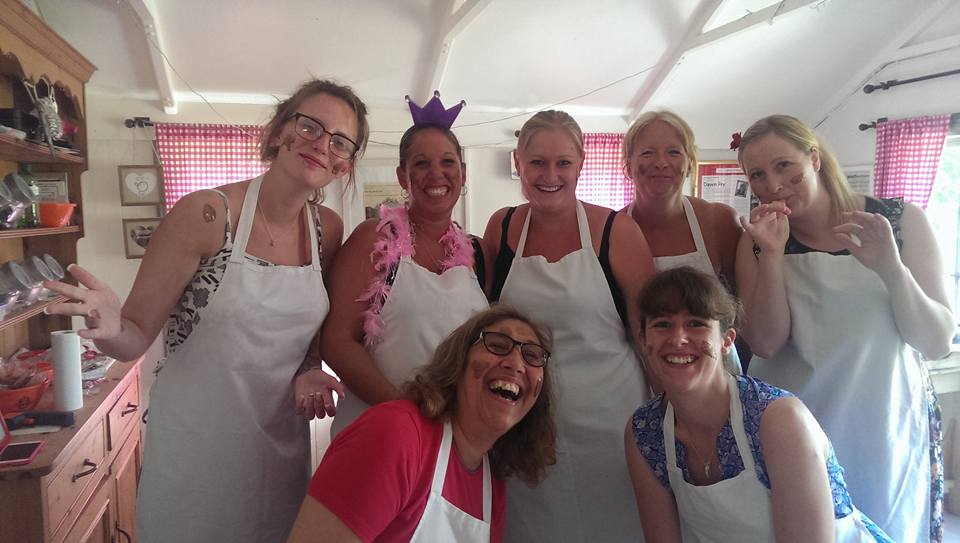Whether you run your own business or not, you will come up against running an ‘event’ at some point. The Christmas lunch, a party, or something work-related – you can’t escape!

I’ve been running chocolate workshops for over 12 years, and I love working with chocolate and people.
A workshop, dinner party, or having a table-full at Christmas, the same principles apply to whatever event you might be planning.
Here’s what I’ve learnt from running events
Who’s it for
Who’s your audience?
My events span primary and secondary schools to team building – so the audience is very diverse.
Put yourself in the shoes of the attendees. What will make it interesting and relevant for them? If you are working with small children, there can be no gaps (have some colouring up your sleeve to keep them occupied for example).
Here are some specific tips on running successful school events.
What are the expected outcomes?
If you are being hired to deliver an event, this may be easier to achieve. Ask! It’s best to request a phone call or a face-to-face meeting if possible as you can drill down into expectations and ask specific questions. This allows you to manage expectations too.
Even if it’s a family gathering, take a moment to reflect on the guests and what would be suitable for all, bearing in mind there could be different ages and abilities.
How can you achieve expected outcomes?
Have an open mind. Sometimes a request can seem almost impossible.

Hold that thought for a while and think to yourself I would like a solution to this. See what comes up.
Trust yourself and your previous experiences, don’t be afraid to put your own stamp on something.
Think about yourself and your needs too. Don’t promise something that is at such a high cost to you it will go wrong, cause you too much stress or make you feel resentful.
What’s plan B?
This is not always possible but having a backup plan is a great strategy. It might just be for elements of the event, where you think there could be stumbling blocks. If a crisis happens on the day, you will find a way through. As long as no one is in actual danger, own up, explain, agree to move on – whatever it takes to get things back on track.
Run it through
This is the best way to ensure your event is a success. Imagine the moment the first person arrives, to the moment the last person leaves, what will be happening and when. Then go through exactly what will be required for each element of their time with you.
Make a list as you go.
Prep within an inch of your life

Once you’ve run it through you will know what needs to be prepped beforehand. Do as much as possible. You can’t be too prepared as once your event is underway your attention is required, and time disappears.
Know your limits. Think about what others can bring to the party if you need to have someone on hand to help. Play to your strengths.
Act like a pro
This is not meant to be confusing – you need to be authentic and yourself, but you do need to be the best version of yourself you can be. This does take some energy and it may not feel totally comfortable at first.
Sometimes you have to fake it a little until you make it. This is not being dishonest or inauthentic, it’s acting a little more confident than you feel. It’s about NOT over-sharing how nervous you are or all the things you are worried about that might go wrong. Act like it’s all fine, and if it doesn’t feel fine just yet, keep the faith that it will.
It’s your event, you are responsible for creating some atmosphere, be engaging and interesting, and put lots of energy into making it a success. You can only do so much though, and sometimes your best is not good enough for everyone. We don’t always know their story and will need to chalk it up to experience.
Gain valuable feedback
Find out how your event was received. A corporate-style event makes this a little easier as you can supply feedback forms.
Talk to people, make a call, go over elements of the event with them, especially if you felt it could have gone better at certain points. Listen.
You will pick up little nuggets at the event itself if you are open to hearing how people are experiencing their time with you.
Review and improve
Go over the event in fine detail. Think about those things that worked well, do more of them. For the things that didn’t work quite as well, or you gained insight from feedback, tweak. Keep honing as we can always improve.

Seriously, if you really want to know what I’ve learnt from running events, add chocolate! You don’t have to be a chocolatier, you could just throw in a tasting for fun, everyone will love it.
Every event is hard work as it will take effort and energy to make it work well. Hosting a great event is such a buzz, one that you will learn and grow from too.
Be confident in your event and others will follow suit. Enjoy and don’t forget to come and tell us all about it.
